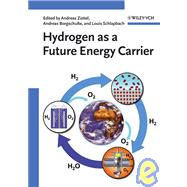
Note: Supplemental materials are not guaranteed with Rental or Used book purchases.
Purchase Benefits
Looking to rent a book? Rent Hydrogen As a Future Energy Carrier [ISBN: 9783527308170] for the semester, quarter, and short term or search our site for other textbooks by Züttel, Andreas; Borgschulte, Andreas; Schlapbach, Louis. Renting a textbook can save you up to 90% from the cost of buying.
| Preface | p. IX |
| List of Contributors | p. XI |
| Introduction | p. 1 |
| References | p. 6 |
| History of Hydrogen | p. 7 |
| Timeline of the History of Hydrogen | p. 7 |
| The Hindenburg and Challenger Disasters | p. 14 |
| References | p. 20 |
| Hydrogen as a Fuel | p. 23 |
| Fossil Fuels | p. 23 |
| The Carbon Cycle and Biomass Energy | p. 37 |
| The Hydrogen Cycle | p. 43 |
| References | p. 68 |
| Properties of Hydrogen | p. 71 |
| Hydrogen Gas | p. 71 |
| Interaction of Hydrogen with Solid Surfaces | p. 94 |
| Catalysis of Hydrogen Dissociation and Recombination | p. 108 |
| The Four States of Hydrogen and Their Characteristics and Properties | p. 125 |
| Surface Engineering of Hydrides | p. 132 |
| References | p. 139 |
| Hydrogen Production | p. 149 |
| Hydrogen Production from Coal and Hydrocarbons | p. 149 |
| Electrolysis: Hydrogen Production Using Electricity | p. 155 |
| References | p. 163 |
| Hydrogen Storage | p. 165 |
| Hydrogen Storage in Molecular Form | p. 165 |
| Hydrogen Adsorption (Carbon, Zeolites, Nanocubes) | p. 173 |
| Metal Hydrides | p. 188 |
| Complex Transition Metal Hydrides | p. 195 |
| Tetrahydroborates as a Non-transition Metal Hydrides | p. 203 |
| Complex Hydrides | p. 211 |
| Storage in Organic Hydrides | p. 237 |
| Indirect Hydrogen Storage via Metals and Complexes Using Exhaust Water | p. 244 |
| References | p. 256 |
| Hydrogen Functionalized Materials | p. 265 |
| Magnetic Heterostructures - A Playground for Hydrogen | p. 265 |
| Optical Properties of Metal Hydrides: Switchable Mirrors | p. 275 |
| References | p. 327 |
| Applications | p. 335 |
| Fuel Cells Using Hydrogen | p. 335 |
| Borohydride Fuel Cells | p. 364 |
| Internal Combustion Engines | p. 371 |
| Hydrogen in Space Applications | p. 381 |
| References | p. 410 |
| Index | p. 415 |
| Table of Contents provided by Ingram. All Rights Reserved. |
The New copy of this book will include any supplemental materials advertised. Please check the title of the book to determine if it should include any access cards, study guides, lab manuals, CDs, etc.
The Used, Rental and eBook copies of this book are not guaranteed to include any supplemental materials. Typically, only the book itself is included. This is true even if the title states it includes any access cards, study guides, lab manuals, CDs, etc.